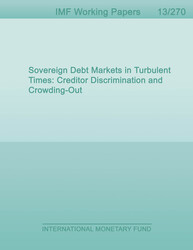
Sovereign Debt Markets in Turbulent Times: Creditor Discrimination and Crowding-Out
WP/13/270
In 2007, countries in the Euro periphery were enjoying stable growth, low deficits, and low spreads. Then thefinancial crisis erupted and pushed them into deep recessions, raising their deficits and debt levels. By 2010,they were facing severe debt problems. Spreads increased and, surprisingly, so did the share of the debt held by domestic creditors. Credit was reallocated from the private to the public sectors, reducing investment and deepening the recessions even further. To account for these facts, we propose a simple model of sovereignrisk in which debt can be traded in secondary markets. The model has two key ingredients: creditordiscrimination and crowding-out effects. Creditor discrimination arises because, in turbulent times, sovereign debt offers a higher expected return to domestic creditors than to foreign ones. This provides incentives for domestic purchases of debt. Crowding-out effects arise because private borrowing is limited by financial frictions. This implies that domestic debt purchases displace productive investment. The model shows that these purchases reduce growth and welfare, and may lead to self-fulfilling crises. It also shows how crowding-out effects can be transmitted to other countries in the Eurozone, and how they may be addressed by policies at the European level.
Publication date: December 2013
ISBN: 9781484335963
$18.00
Add to Cart by clicking price of the language and format you'd like to purchase
Available Languages and Formats
| English |
Prices in red indicate formats that are not yet available but are forthcoming.
Topics covered in this book
This title contains information about the following subjects.
Click on a subject if you would like to see other titles with the same subjects.
sovereign debt , rollover crises , secondary markets , economic growth
Summary
Copyright © 2010 - 2024
Powered by:
AIDC



